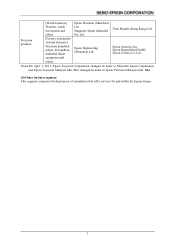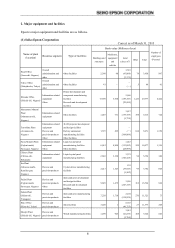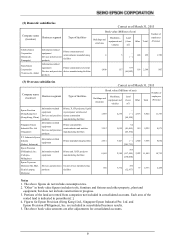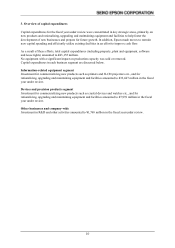Epson 2013 Annual Report Download - page 18
Download and view the complete annual report
Please find page 18 of the 2013 Epson annual report below. You can navigate through the pages in the report by either clicking on the pages listed below, or by using the keyword search tool below to find specific information within the annual report.
17
17. Epson is vulnerable to proceedings relating to antitrust laws and regulations.
With business operations that span the globe, Epson is subject in Japan and overseas to proceedings relating
to antitrust laws and regulations, such as those prohibiting private monopolies and those protecting fair
trade. Overseas authorities sometimes investigate or gather information on certain industries and as part of
this, Epson’s market conditions and sales methods may come under investigation. Such investigations and
proceedings, or violations of applicable statutes could interfere with Epson’s sales activities. They could also
potentially damage Epson's social credibility or result in a large civil fine. Any of these could adversely
affect Epson’s operating results.
The Company and certain of its consolidated subsidiaries are currently under investigation by the European
Commission and other competition authorities regarding allegations of involvement in a liquid crystal
display price-fixing cartel. It is difficult at this time to predict the outcome of these investigations and when
they may be settled.
18. Epson is at risk of material legal actions being brought against it.
Epson conducts business internationally. Its primary businesses are the development, manufacture and sale
of information-related equipment, devices and precision products, and sensing and industrial solutions, as
well as the provision of related services. Given the nature of its businesses, there is a possibility that an
action could be brought or legal proceedings could be started against it regarding, for example, intellectual
property rights, product liability, antitrust laws or environmental regulations.
As of the date it submitted its Annual Securities Report, Epson was contending the following material
actions.
In Germany, the organization for collecting copyright fees on behalf of copyright holders,
Verwertungsgesellschaft Wort (“VG Wort”), has brought a series of legal actions seeking payment of
copyright fees against importers and venders of PCs, printers and other digital equipment that is capable of
reproducing copyrighted works.
In January 2004 VG Wort brought a civil action against Epson Deutschland GmbH (“EDG”), a
consolidated subsidiary of the Company, to seek payment of copyright fees on single-function printers. The
initial judgment determined that the aforementioned printer is subject to a copyright fee and decreed that
EDG pay the fee at a rate of between 10 to 256.70 euros per printer depending on the printer’s printable
pages per minute. However, the claim was dismissed by the appeals court and the supreme court. The
plaintiff, however, unsatisfied with this ruling, appealed to the Federal Constitutional Court of Germany.
On December 21, 2010, the Federal Constitutional Court ruled that the August 2008 ruling of the supreme
court violates rights set forth in Article 14 of the constitutional law of Germany. It thus dismissed the ruling
of the supreme court and referred the case back to the supreme court for review. Then, in July 2011, the
supreme court referred the case to the Court of Justice of the European Union, and an inquiry was begun in
October 2012. Companies in general, including Epson, and industry organizations are showing a
willingness to take a stance against the expansion of the scope of such copyright fees.
In June 2010, Epson Europe B.V. ("EEB"), a consolidated subsidiary of Seiko Epson, brought a civil suit
against La SCRL Reprobel ("Reprobel"), a Belgium-based group that collects copyright royalties, seeking
restitution for copyright royalties for multifunction printers. These two lawsuits were adjoined. EEB's
claims were rejected at the first trial, but EEB, dissatisfied with the decision, intends to appeal.
Apart from this, civil actions have been brought against the Company and certain of its consolidated
subsidiaries by multiple customers in multiple countries, including the United States, regarding allegations
of involvement in a liquid crystal display price-fixing cartel.
It is difficult at this time to predict the outcome of these civil actions and when they may be settled, but
Epson's operating results and future business could be affected, depending on the outcomes of suits and
legal proceedings.
19. Epson is vulnerable to certain risks in internal control over financial reporting.
Epson has established and operates internal controls to ensure the reliability of financial reporting.
With the establishment and operation of internal controls over financial reporting high on its list of
important management issues, Epson has been pursuing a Group-wide effort to audit and improve corporate
oversight of its subsidiaries and affiliates. However, since there is no assurance that Epson will be able to
























